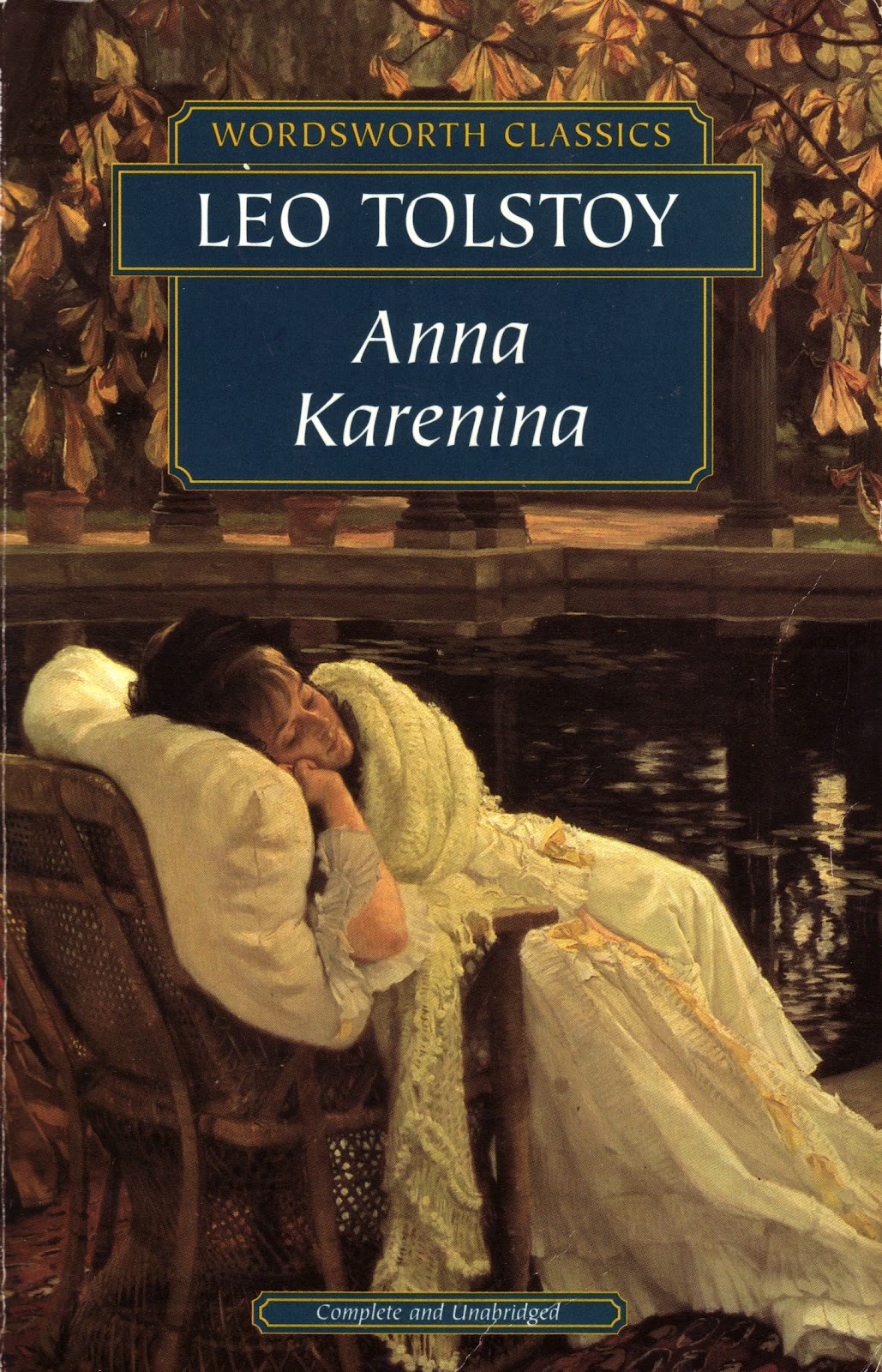Our book choice for December 2014 is Anna Karenina by Leo Tolstoy. Tolstoy’s classic story of doomed love is one of the most admired novels in world literature. Generations of readers have been enthralled by his magnificent heroine, the unhappily married Anna Karenina, and her tragic affair with dashing Count Vronsky.
Anna Karenina is a novel by Leo Tolstoy, first published in book form in 1878. Widely considered to be one of the greatest works of literature ever written, Tolstoy himself called it his first true novel. It was initially released in serial installments from 1875 to 1877, all but the last part appearing in the periodical The Russian Messenger.
The novel deals with themes of betrayal, faith, family, marriage, Imperial Russian society, desire, and rural vs. urban life. The story centers on an extramarital affair between Anna and dashing cavalry officer Count Alexei Kirillovich Vronsky that scandalizes the social circles of Saint Petersburg and forces the young lovers to flee to Italy in a search for happiness, but after they return to Russia, their lives further unravel. Trains are a motif throughout the novel, with several major plot points taking place either on passenger trains or at stations in Saint Petersburg or elsewhere in Russia. The story takes place against the backdrop of the liberal reforms initiated by Emperor Alexander II of Russia and the rapid societal transformations that followed. The novel has been adapted into various media including theater, opera, film, television, ballet, figure skating, and radio drama.
The Story
Anna Karenina is a complex and multilayered novel with a large cast of characters. The main characters are Anna, Vronsky, and Levin. Anna is a beautiful and intelligent woman who is married to Alexei Karenin, a high-ranking government official. Vronsky is a young and handsome cavalry officer who is instantly smitten with Anna. Levin is a wealthy landowner who is searching for meaning in life.
The novel begins with Anna traveling to Moscow to visit her brother, Stiva, and his wife, Dolly. Stiva is having an affair with their children’s former governess, and Dolly is threatening to leave him. Anna is able to reconcile the couple, but she is also drawn to Vronsky, who is a friend of Stiva’s.
Anna and Vronsky begin an affair, and they are soon caught up in a passionate whirlwind. However, their affair is not without its challenges. Anna’s husband is suspicious, and Vronsky’s mother disapproves of the match.
Eventually, Anna and Vronsky decide to leave Russia and start a new life together in Italy. However, their happiness is short-lived. Anna becomes increasingly unhappy in Italy, and she begins to feel isolated from her friends and family. Vronsky, on the other hand, is bored and restless.
Anna Karenina is a powerful and moving novel that explores the themes of love, loss, and the search for meaning in life. It is a complex and multilayered novel with a large cast of characters, but it is also a novel that is ultimately about the human condition. Anna Karenina is a classic of Russian literature, and it is a novel that continues to be read and enjoyed by people all over the world.
In addition to the themes of love, loss, and the search for meaning in life, Anna Karenina also explores other themes, such as the role of women in society, the nature of happiness, and the relationship between the individual and society. The novel is also notable for its realistic portrayal of Russian society in the late 19th century.
Discussion Questions for Anna Karenina
- “All happy families are alike; each unhappy family is unhappy in its own way.” Do you agree with its assertion?
- When we meet Kitty, she is tangled in an interesting web of courtship with two men. Do you get the sense that Kitty will make a good decision for herself? Do you feel she acts “rightly” towards Levin? What does the author say that’s interesting about each of the men and Kitty’s feelings about them?
- What was your first impression of Anna?
- Is Vronsky a worthy and appropriate lover for the passionate Anna? In what ways does he potentially fall short in this role?
- What role does Society play in the novel? How unique is the world of Anna Karenina in time and place?
- How are the two primary relationships in the novel compared? Why has Tolstoy presented them in this way?
- At the beginning of the novel, we learn that Anna has a very close bond with her son Seryozha. What does it mean for her to leave him in order to be with Vronsky?
- What did you think about the way Levin proposed to Kitty?
- In Part Five, both Vronsky and Levin are described as being “not as happy as they expected to be.” From what you know of them, do you think their expectations were realistic?
- What do you think about Anna as a mother?
- How does each character change when living in the city vs the country?
- When Levin and Anna finally meet, what did you think of their interaction? Is it as you expected it might be, or different? How do you feel about the fact that Levin pities Anna?
- What do you think about the fact that Seryozha has grown to consider his memories of his mother “shameful?” What impact do you expect this has on Karenin and Anna?
- Talk about Anna’s extreme jealousy. Do you feel it is founded, or is it a reflection of other things going on in her life?
- What are your feelings about Anna’s death. Talk about her reasons for doing it, her choices surrounding it.
- In the end, how do you feel about Levin’s relationship with Kitty? Are they a happily married couple?
- What do you think about the final passage, where Levin’s ultimate life philosophy is revealed?
Individual Ratings
DKB's Rating 





